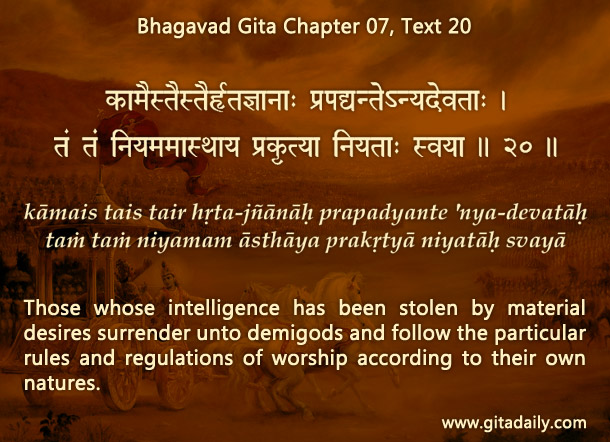We humans have an innate need to worship something bigger than ourselves. Thus, sports fans adore a sports-star, consciously or subconsciously equating their idol with God. Similarly, movie-lovers worship a movie star, and political activists worship a political leader. Nowadays, some technology enthusiasts fantasize that a super-computer with extraordinary artificial intelligence may be God.
Pertinently, the Bhagavad-gita (07.20) indicates that when our knowledge is stolen by worldly desires, then we surrender to whichever “god” promises fulfillment of those desires. But those promises invariably turn out to be disappointing, even deceptive – nothing worldly can satisfy our heart’s need to worship.
When we project our desires on the divine, we settle for some conception of the divine that titillates our conditioned imagination, temporarily. But that conception distorts our understanding of the actual divine, thereby leading not to our elevation or liberation, but to the perpetuation of our deluded worldly existence.
Thankfully, scripture reveals the supreme divinity, the worthiest object of worship. The Bhagavad-gita outlines a vision of God who is all-attractive – who is, in fact, the source of the attractiveness of everything attractive in this world (10.41). That ultimate aspiration of all hearts, that transcendental Absolute, is Krishna. He is the supreme proprietor, the supreme controller and the supreme benefactor – knowing him, we attain peace (05.29).
However, if we aren’t guided by revelation, our need to worship gets misguided to whoever or whatever seems attractive to our circumstantial emotions or conceptions.
Gita wisdom explains that the attractiveness of such objects needn’t be denied or rejected; it needs to be seen as a pointer to all-attractive Krishna. With this understanding, we practice bhakti-yoga, focusing our mind on him instead of some substitute.
To know more about this verse, please click on the image
Explanation of article:
Podcast:


Leave A Comment